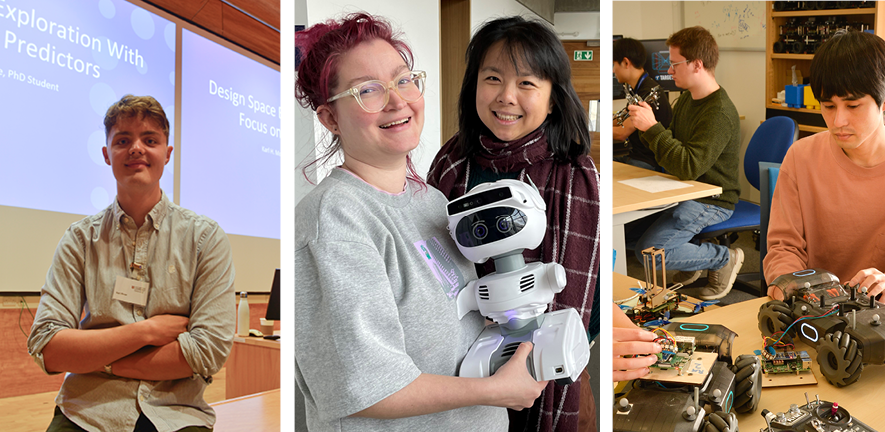We offer two postgraduate programmes, the MPhil in Advanced Computer Science and the PhD in Computer Science.

(Above: students in Computer Architecture, Affective Intelligence & Robotics, and Multi-Robot and Multi-Agent Systems.)
-
The MPhil in Advanced Computer Science runs for nine months, from October to the following June. It is a research-based Masters' programme and is most suited to students who wish to continue onto a PhD and those interested in careers in a research institution.
-
The PhD in Computer Science is a three-year programme of individual research on a topic agreed by the student and this Department. PhD students work under the guidance of a supervisor who is a member of the academic staff. There is no compulsory coursework. PhD students are expected to complete the substance of their research by the end of their third year and submit their thesis then or within a few months. Most students start in October, but students can also start in January.
Student numbers
At any given time, we host 70 MPhil students (plus a further 20-30 Part III students, who share the modules on the MPhil programme) and around 180 PhD students.
Why study Computer Science at Cambridge?
As the first Computer Science department in the country (established over 80 years ago), research here at Cambridge helped to lay the foundations of modern computing. We built the first programmable computer to come into service and led the early development of programming languages and operating systems.
Today, we continue to innovate and advance the field in a wide range of areas from AI to computer architecture, human-computer interaction, and quantum computing. As a postgraduate student here, you’ll have the opportunity to learn from research leaders in their areas and work on projects at the cutting edge of these technologies.
Where you’ll study
Our home here in the purpose-built William Gates Building in West Cambridge offers a world-class research facility that combines theory with practical activities.
Members of this Department also have close links with many other departments and institutions across Cambridge University, such as the Engineering Department and the Cambridge Conservation Initiative. This reflects our open and interdisciplinary approach.

